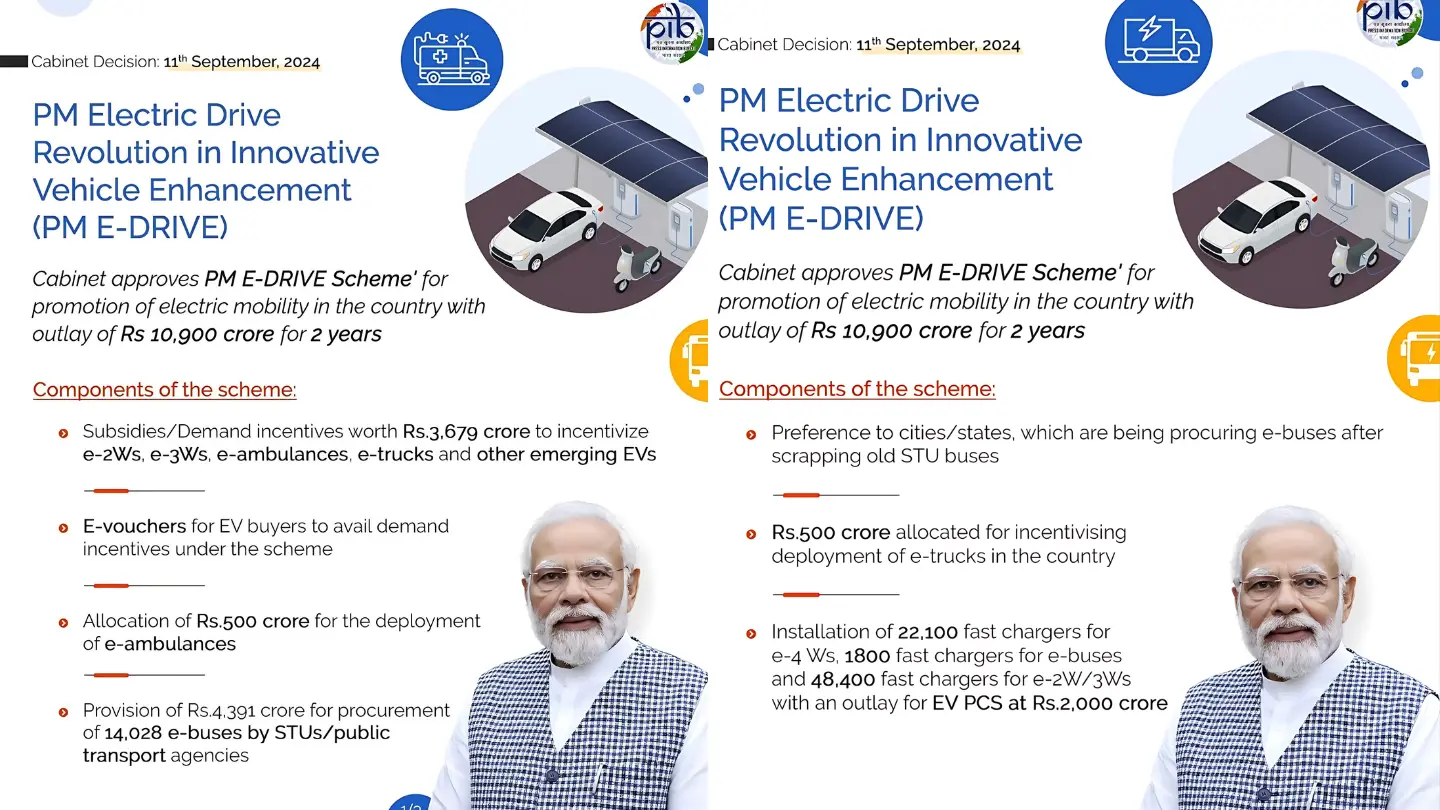
The Union Cabinet headed by Prime Minister Narendra Modi has given the green signal for a new scheme called the “PM Electric Drive Revolution in Innovative Vehicle Enhancement (PM E-DRIVE) Scheme” to promote electric mobility across India.
The scheme, proposed by the Ministry of Heavy Industries (MHI), will have a total investment of ₹10,900 crore over two years. This scheme aims to maximize the adoption of electric vehicles and support the development of related infrastructure.
Here are some key details about the scheme that each one needs to know:
Nitin Gadkari Ji Posted on LinkedIn about the scheme, he wrote “Union Cabinet, chaired by Prime Minister Shri Narendra Modi Ji, has approved the ‘PM E-DRIVE Scheme’ with a budget of Rs 10,900 over 2 years to advance electric mobility in India.
The scheme provides Rs 3,679 crore in subsidies and incentives for electric two-wheelers, three-wheelers, e-ambulances, e-trucks, and other EVs, including e-vouchers for buyers. It also allocates Rs 500 crore for e-ambulances and Rs 4,391 crore for 14,028 e-buses.
The scheme supports the installation of 22,100 fast chargers for e-4Ws, 1,800 for e-buses, and 48,400 for e-2Ws/3Ws, with a total investment of Rs 2,000 crore in charging infrastructure. Priority will be given to cities and states buying e-buses by scrapping old buses, and Rs 500 crore is allocated for e-truck deployment.”
To simplify purchasing electric vehicles, the Ministry of Heavy Industries is introducing E-vouchers.
Upon purchasing an EV, buyers will receive an Aadhaar-authenticated e-voucher through the scheme’s online portal, sent directly to their registered mobile number. Both the buyer and the dealer will sign this voucher, which will then be uploaded to the PM E-DRIVE portal.
This streamlined process ensures that the original equipment manufacturer (OEM) can easily claim reimbursement for the incentives provided under the scheme.
The PM E-DRIVE Scheme also lays focus on Electric Ambulances, aligned with a broader initiative to integrate electric vehicles into the healthcare sector.
A total of Rs 500 Crore will be invested in the E- ambulances which will ensure secure and safe transport facilities for the patients.
Ministry of Health and Family Welfare (MoHFW), the Ministry of Road Transport and Highways (MoRTH), and other relevant stakeholders will take care of the proper functioning of E- Ambulances.
The government has earmarked ₹4,391 crore for the procurement of 14,028 electric buses by state transport undertakings (STUs) and public transport agencies.
This initiative focuses on nine major cities with populations exceeding 40 lakh, such as Delhi, Mumbai, Kolkata, Chennai, and Bengaluru. These cities are prioritized to boost urban mobility through e-buses.
Additionally, the scheme supports the acquisition of intercity and interstate e-buses, with a preference for buses purchased after scrapping old ones at MoRTH-approved vehicle scrapping centers.
Trucks, which are major contributors to air pollution, have been included in the scheme, with ₹500 crore allocated to incentivize the purchase of electric trucks.
These incentives will be available for those who provide scrapping certificates from authorized scrapping centers.
This policy aligns with the MoRTH Vehicle Scrapping Scheme, encouraging a shift toward cleaner transportation and reducing emissions.
To reduce “range anxiety” among EV users, the scheme dedicates ₹2,000 crore to set up extensive charging infrastructure.
The plan includes the installation of 22,100 fast chargers for electric four-wheelers, 1,800 fast chargers for e-buses, and 48,400 fast chargers for electric two- and three-wheelers.
These chargers will be installed in cities with high EV penetration and along major highways, ensuring easy access for electric vehicles and supporting long-distance travel.
Recognizing the growing EV ecosystem, ₹780 crore has been allocated for modernizing vehicle testing agencies under the Ministry of Heavy Industries.
These agencies will be upgraded to handle emerging green mobility technologies.
This modernization effort is essential for ensuring the safety, reliability, and compliance of new EV technologies with industry standards.
The PM E-DRIVE scheme aims to foster the adoption of electric vehicles by offering upfront incentives and developing charging infrastructure.
This initiative supports the government’s goal of promoting competitive and resilient EV manufacturing under the Aatmanirbhar Bharat initiative.
The scheme’s phased manufacturing program (PMP) encourages domestic production, thereby strengthening the EV supply chain and promoting sustainable transportation solutions.
This post was last modified on September 12, 2024 1:35 pm
In a major stride toward sustainable mobility, the Himachal Pradesh Police have incorporated six custom-modified Tata Curvv electric vehicles into…
In India, the automotive and transport industry is undergoing significant changes. This transformation isn't just about improving roads and infrastructure;…
Montra Electric, the clean mobility brand from the prestigious Murugappa Group, has launched the All-New Super Auto, a next-generation electric…
Union Minister Nitin Gadkari (Minister of Road Transport and Highways of India) has once again made a bold statement that’s got…
India’s electric four-wheeler (E4W) market slowed in September 2025, following a record-breaking August, with 15,038 units sold, representing an 18%…
India’s EV market hit 1,04,056 electric two-wheeler sales in September 2025. TVS, Bajaj, and Ather led the chart, while Ola…
This website uses cookies.